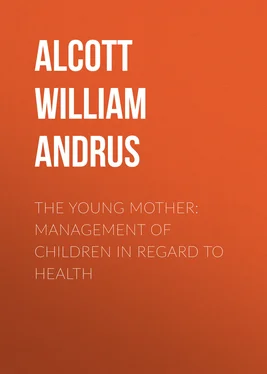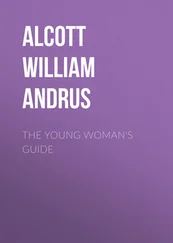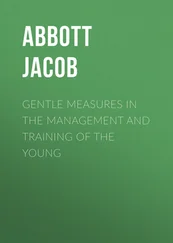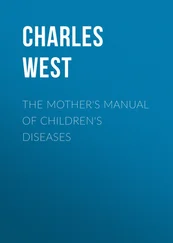William Alcott - The Young Mother - Management of Children in Regard to Health
Здесь есть возможность читать онлайн «William Alcott - The Young Mother - Management of Children in Regard to Health» — ознакомительный отрывок электронной книги совершенно бесплатно, а после прочтения отрывка купить полную версию. В некоторых случаях можно слушать аудио, скачать через торрент в формате fb2 и присутствует краткое содержание. Жанр: popular_business, upbringing_book, foreign_edu, на английском языке. Описание произведения, (предисловие) а так же отзывы посетителей доступны на портале библиотеки ЛибКат.
- Название:The Young Mother: Management of Children in Regard to Health
- Автор:
- Жанр:
- Год:неизвестен
- ISBN:нет данных
- Рейтинг книги:4 / 5. Голосов: 1
-
Избранное:Добавить в избранное
- Отзывы:
-
Ваша оценка:
- 80
- 1
- 2
- 3
- 4
- 5
The Young Mother: Management of Children in Regard to Health: краткое содержание, описание и аннотация
Предлагаем к чтению аннотацию, описание, краткое содержание или предисловие (зависит от того, что написал сам автор книги «The Young Mother: Management of Children in Regard to Health»). Если вы не нашли необходимую информацию о книге — напишите в комментариях, мы постараемся отыскать её.
The Young Mother: Management of Children in Regard to Health — читать онлайн ознакомительный отрывок
Ниже представлен текст книги, разбитый по страницам. Система сохранения места последней прочитанной страницы, позволяет с удобством читать онлайн бесплатно книгу «The Young Mother: Management of Children in Regard to Health», без необходимости каждый раз заново искать на чём Вы остановились. Поставьте закладку, и сможете в любой момент перейти на страницу, на которой закончили чтение.
Интервал:
Закладка:
Some persons, observing how little clothing one may accustom himself to use and yet be comfortable, have told us, that so far as mere temperature is concerned, we need no clothing at all. They relate the story of the Scythian and Alexander. Alexander asked the former how he could go without clothes in such a cold climate. He replied, by asking Alexander how he could go with his face naked. "Habit reconciles us to this;" was the reply. "Think me, then, all face," said the Scythian.
But admitting that certain individuals, and even a few rude tribes, have gone without clothing; did they therefore follow, in this respect, the intentions of nature? The greatest stickler for adhering to nature's plan, cannot prove this. Analogy is against it. Most of the other animals, even in hot climates, are furnished with a hairy covering from the first; and in cold climates, the Author of their being has even provided them with an increase of clothing for the winter. Their fur, on the approach of cold weather, not only becomes whiter, and therefore conducts the heat away from the body more slowly, but, as every dealer in furs well understands, it becomes softer and thicker. And yet the blood of the furred animals of cold countries is as warm as ours, if not warmer.
The inferences which it seems to me we ought to make from this are, that if other animals require clothing, and even a change of clothing, so does man; and that as the Creator has left him to provide, by his own ingenuity, for a great many of his wants, instead of furnishing him with instinct to direct him, so in relation to dress. And even if it could be proved that dress were naturally unnecessary, with reference to temperature, I should still defend its use on other principles. The few speculative minds, therefore, that in the vagaries of their fancy, but never in their practice, reject it, are not to be regarded.
The principle laid down in the commencement of the chapter on Temperature, is the great principle which should guide us in regard to dress. But although we should always keep a little too cool rather than a little too warm, it is by no means desirable to be cold. Any degree of chilliness, long continued, interrupts the functions which the skin ought to perform, and thus produces mischief.
The same rules, in this respect, apply to eating, as well as to dress. It is better to eat a little less than nature requires, than a little more. It is a generally received opinion, however, that mankind frequently, at least in this country, eat about twice as much as health requires. This is owing to habit; and perhaps the power of the latter is as great in this respect as in regard to dress.
The great point in regard to food or dress is, to begin right, and, observing what nature requires—studying at the same time the testimony of others—to endeavor to keep within the bounds she has assigned. It has already been more than intimated, that if the nursery be kept in a proper temperature, a single loose piece of dress is, for some time, all that is required. In pursuance of this principle, through life, I believe few persons would be found who would need more at one time than a single suit of woollen clothes, even in the severest winters of our northern climate.
I have always observed that they who wear the greatest amount of clothing, are most subject to colds. There are obvious reasons why it should be so. This, then, if a fact, is one of the strongest reasons in favor of acquiring a habit of going as thinly clad as we possibly can, and not at the same time feel any inconvenience.
But after all, whether it be winter or summer, we must vary our clothing with the variations of the weather, as indicated by the thermometer, and our own feelings. Sometimes, in our ever-changing and ever-changeable climate, it may be necessary to vary our dress three or four times a day. Some cry out against this practice as dangerous, but I have never found it so. I have known persons who made it a constant practice; and I never found that they sustained any injury from it, except the loss of a little time; and the increase of comfort was more than enough to compensate for that. There is one thing to be avoided, however, whether we change our clothing—our linen especially—twice a day, or only twice a week—which is, dampness .
The practice of putting caps on infants is happily going by; and perhaps it may be thought unnecessary for me to dwell a single moment on the subject. But as the practice still prevails in some parts of the country, it may be well to bestow upon it a few passing remarks.
Many mothers have not considered that the circulation of the blood in young infants is peculiarly active; that a large amount of blood is at that period carried to the head; that in consequence of this, the head is proportionably hotter than in adults; and that from this source arises the tendency of very young children to brain-fever, dropsy in the head, and other diseases of this part of the system. But these are most undoubted facts.
Hence one reason why the heads of infants should be kept as cool as possible; and though a thin cap confines less heat than a thick head of hair does when they are older, yet they are less able to bear it. The truth is, that nature furnishes a covering for the head, just about as fast as a covering is required, and the child's safety will permit.
At the present day, few persons will probably be found, who will defend the utility of caps, any longer than till the hair is grown. The general apology for their use after this period, and indeed in most instances before, is, that they look pretty. "What would people say to see my darling without a cap?"
But when the head is kept, from the first, totally uncovered, the hair grows more rapidly, dandruff and other scurfy diseases rarely attack the scalp; catarrh, snuffles, and other similar complaints, and above all, dropsy in the head, seldom show themselves; and the period of cutting teeth, that most dangerous period in the life of an infant, is passed over with much more safety.
"Nothing but custom," says a foreign writer, "can reconcile us to the cap, with all its lace and trumpery ornaments, on the beautiful head of a child; and I would ask any one to say candidly, whether he thinks the children in the pictures of Titian and Raffaelle would be improved by having their heads covered with caps, instead of the silken curls—the adornment of nature—which cluster round their smiling faces. If there were no other reason for disusing caps for infants, but the improvement which it produces in the appearance of the child, I would maintain that this is a sufficient inducement." And I concur with him fully.
As to the notion—now I hope nearly exploded—that it is necessary to cover up the "open of the head," as it is called, nothing can be more idle. This part of the head requires no more covering than any other part; and if it did, all the dress in the world could not affect it in the least, except to retard the growth of the bones, which, in due time, ought to close up the space; and this effect, anything which keeps the head too hot might help to produce. Of the folly of wetting the head with spirits, or any other medicated lotions, and of making daily efforts to bring it into shape, it is unnecessary to speak in the present chapter.
The hats worn in this country are almost universally too warm. But if it is a great mistake in adults to wear thick, heavy hats, it is much more so in the case of children.
The infant in the nursery, as we have already seen, needs no covering of the kind. It is absolutely necessary that the head should be kept as cool as possible; and absolutely dangerous to cover it too warmly. At a later period, however, the danger greatly diminishes, because the circulation of the blood becomes more equal, and does not tend so much towards the brain.
Читать дальшеИнтервал:
Закладка:
Похожие книги на «The Young Mother: Management of Children in Regard to Health»
Представляем Вашему вниманию похожие книги на «The Young Mother: Management of Children in Regard to Health» списком для выбора. Мы отобрали схожую по названию и смыслу литературу в надежде предоставить читателям больше вариантов отыскать новые, интересные, ещё непрочитанные произведения.
Обсуждение, отзывы о книге «The Young Mother: Management of Children in Regard to Health» и просто собственные мнения читателей. Оставьте ваши комментарии, напишите, что Вы думаете о произведении, его смысле или главных героях. Укажите что конкретно понравилось, а что нет, и почему Вы так считаете.












